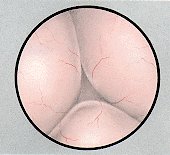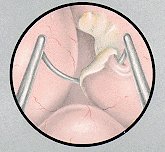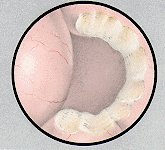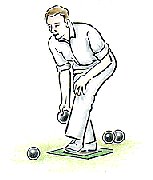| 
The prostate is an organ found only in men. It is the shape and size of a walnut and is found just below the bladder. It is a gland which discharges fluid believed to keep sperm alive. When a man has an orgasm (climax) it is believed that the prostate releases some of the seminal fluid which is ejaculated. When you pass water, your urine flows from the bladder along a tube (the urethra) and out through the penis. The prostate sits just below the bladder and the urethra has to pass through it before reaching the penis.
|
|

Enlargement of the prostate
As a man gets older, usually from the age of 40, the prostate grows. This is due to natural hormone changes connected to ageing and happens to all men. The amount of enlargement varies from man to man and, in many, causes no difficulties. However, in some men, the enlarged prostate interferes with the passage of urine. If the enlarging prostate begins to narrow the urethra, it sometimes becomes more difficult for urine to pass through. The prostate can increase to many times its normal size. If this happens, the bladder muscles must work harder to force urine through the narrowed urethra. Normally, if the symptoms are mild, it may be possible to treat the patient with drugs.
|

Sometimes, despite drug treatment, the symptoms persist or get worse and then surgery may be required. Surgery is often also required if the patient develops retention of urine and is unable to pass any urine at all. Surgery on the prostate is an effective way of reducing symptoms.
|

The effect on your sexual life
The removal of prostate tissue normally has no effect on a man’s ability to have sex. However, a small minority do report a loss of sexual function following the operation.
Retrograde ejaculation
One lasting change from this operation is the “dry orgasm”. Before the operation, the involuntary sphincter created resistance to stop semen moving up the urethra into the bladder at orgasm. The cored-out prostate offers less resistance and so allows the semen to travel up the urethra into the bladder. This causes you no harm at all and you pass the semen in your urine, which may be cloudy as a result.
Fertility
Because of the “dry orgasm”, you are unlikely to father children after this operation. It is important to let your surgeon know if you are planning to have children. On the other hand, it is not 100% certain that you will be sterile either, so you cannot rely on this as effective contraception.
Sensation of orgasm
Most patients find that there is a change in the sensation of orgasm.
Impaired erection
Between 4-30% of men reported that it was more difficult to get an erection after their prostate surgery. This is sometimes the result of any kind of surgery, so it may not always be due to the physical change following this operation.
Leakage of urine
The prostate operation usually improves leakage. The sphincter which acts as a valve to stop the flow of urine is very rarely affected by the operation. A small number of patients can get a temporary leakage lasting only a few days.
Bleeding
Although this is very rare, excessive bleeding can occur immediately after the operation, and a further operation may be required to stop it. This is more likely to happen when patients are taking drugs which interfere with blood clotting. It is important that you inform your surgeon at the outpatient clinic if you are taking Aspirin or anticoagulants such as Warfarin, when you are booked for your admission to hospital. Also let the ward staff know if you have been taking any of these medications. Aspirin needs to be stopped for at least 10 days before a prostate operation.
Need for a re-operation
About one in ten men who have a prostate operation will require another during their lifetime. This is necessary if prostate tissue re-grows and squeezes the urethra again. It can take up to 15 years for this problem to recur.
Spraying
Occasionally, the urine comes out in a spray after the operation. This may require a small operation to correct it.
Death
There is a risk of death after any operation. After a prostate operation, death occurs in less than 1 in 300, nearly always in very elderly men with other serious medical conditions.
Other complications
As with any major operation, the usual complications of surgery may occur. These can include chest infections, heart attacks or vein thrombosis.
|

A special telescope (called a resectoscope) is used. After you are anaesthetised, this is carefully inserted up the penis. It allows the surgeon to see the prostate and up into the bladder. It uses an electric current to cut away pieces of the prostate which are then washed out and sent away for further examination. Because the operation takes place through the penis, there is no visible scar. Nevertheless, you have been cut inside and you need to allow time for healing to take place afterwards. The operation usually takes about 40-60 minutes.
|


The anaesthetic is often one of the main concerns of patients. Modern anaesthetics are very safe, and serious complications are uncommon.
Prostatectomy is usually performed under a general or spinal anaesthetic. The anaesthetist will decide which is best in your particular case. The spinal anaesthetic makes you numb from the waist down so that you feel nothing during the operation, although you remain conscious. If you wish it, with a spinal anesthetic the anaesthetist can also sedate you so you sleep throughout the procedure. Alternatively, it is possible to stay awake during the operation and even get the opportunity to watch it on a TV monitor as it happens.
You should tell the anaesthetist about any of the following:
 |
prior experience of anaesthesia in hospital |
 |
your medical history |
 |
any medicines you may take |
 |
any dental problems you may (especially caps and crowns) |
 |
allergies (especially to drugs) |
 |
back problems |
 |
chest problems and smoking |
|

You will usually be told the day before when your operation is to be performed. Do not be alarmed if there is a sudden change of plan, as operating theatres sometimes have to be used for emergencies. A morning operation means that you will not be allowed anything to eat from midnight the night before. For an afternoon operation, you will be given a light breakfast and then nothing to eat after 8.00am. The “fasting” ensures that you have no food in your stomach when the anaesthetic starts. You may be given instructions which explain this. You may also be given a mild laxative the day before if you are constipated. |
 |

Shortly before being taken to the theatre on your bed or a special trolley, you will be given a cotton gown to wear. A ward nurse and a porter will take you to the theatre, where a reception nurse will check your identification. Your anaesthetist will describe how your anaesthetic is being given and what you will feel as it takes effect.
|
|
 - -
The type of anaesthetic has been chosen for you in advance. The general anaesthetic is administered by an injection into the hand or arm. During the whole operation, the anaesthetist will look after you. Soon after the operation you will regain consciousness. A nurse will give you something to take away any nausea you might experience if you need it. Some patients require oxygen by mask to help recover from the general anaesthetic. It may be up to 4 hours before you may take sips of water, increasing to free fluids and then food, according to what you can tolerate. This gradual return to drinking and eating is to prevent nausea or vomiting due to the remaining anaesthetic in your system. The next day, you should be able to manage normal food.
|

You will remain awake during the operation, or request additional sedation to make you feel sleepy. When you are back on the ward, the power and feeling in your legs will return slowly and you may experience some pins and needles. By the next day you will be completely normal although some patients do suffer headache after this form of anaesthetic |
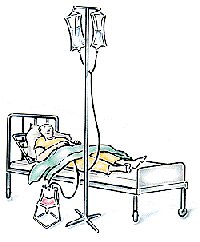 |

You will wake up either in the recovery room or on the ward, where a nurse will take your temperature and regularly check your blood pressure and pulse. Most TURP patients are able to sit up an hour or so after the operation. The first thing you will notice is a large bag of clear fluid above your bed. A plastic tube is attached to the catheter inserted up your penis. The drip inserted into your arm is there to provide you with all the necessary body fluids and nutrients until you are able to eat and drink. This will probably be removed the following day.
The catheter inserted up the penis extends into the bladder. It is held in place by a small balloon in the bladder. It has a bag attached to the end to collect blood and urine.
|
| During the operation, an area inside the body is cut. This has to heal and, while healing, the body is likely to bleed. The catheter acts as a flushing system, allowing fluid to be passed up through the bladder to cleanse it. Do not be alarmed if you see blood (coloured like red wine) in the catheter bag; this is quite normal. The catheter also allows urine to pass out of the system. Whilst the catheter is in place, you may feel that your bladder is full. This is also quite normal and you will realise that urine is flowing out of the bladder automatically, along the catheter all the time, without any need to strain. |
|

Pain is very unusual. If you experience any, your nurse will give you some painkillers. The catheter is not painful but is sometimes a little uncomfortable. During the first few days, a clot of blood may block the catheter. The bladder will feel full and you may have an intense desire to empty it, but urine will be unable to flow out. If you think this has happened, tell the nurse. A doctor or nurse will then flush the catheter with a syringe to clear the blockage. If your catheter feels uncomfortable, it may need to be re-adjusted. Please tell your nurse if this is the case. |
 |
|
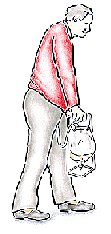 |

You should walk around the ward with your catheter on its stand as soon as possible after the operation. It is advisable to keep moving your legs from time to time when lying down.
When the drainage bag becomes clear, usually after 2-3 days, the catheter is removed. The balloon inside the bladder is deflated and the tube slides out through the penis. This may cause a little discomfort.
It may take a while to control your urine flow immediately after catheter removal. You may feel a constant urge to urinate and may also have leakages. You may also find that you dribble. Do not worry, this is normal and will improve with time. You will be seeing blood or small clots in your urine. Again, this is perfectly normal, until the internal wound has healed. You may also experience some burning or stinging when urinating.
|
You will be encouraged to drink 2-3 litres of fluid per day. Do not restrict your fluid intake because you are worried about leaking.
You may be asked to use a bottle to collect your urine so that the volume can be recorded, and to supply a small specimen to check for infection before being sent home. |
|

Once you have gained sufficient control over your bladder (usually within 4-7 days), you will be allowed home. Your urine will often still be slightly pink.
If possible, try to arrange for someone to drive you home. If not, do not try to drive yourself home - the hospital will arrange some form of transport for you
|
 |
|
 |
After leaving hospital, you will be back in the care of your GP who will receive a full report on your operation. You do not need to call your doctor unless you think there is something wrong. It is seldom necessary to take any new medication after your operation.
When you return home, you should take things easy for a fortnight. It is common to feel a bit flat or depressed for a few days when you first get home. This is natural and will last longer than you think.
During your convalescence you may have any of the following:
Blood clots in your urine
This may continue for a number of weeks after the operation and is due to wound healing. A little extra bleeding is common around 10 -14 days after the operation. But you may find blood in the urine 4-5 weeks later, even if you have had several clear days in-between. Do not worry but ensure that you drink more fluids to flush the system. If you notice heavy bleeding or blood clots which obstruct the flow of urine, contact your GP
Leakages/frequent passage of urine
You may find you “leak” a little when straining or coughing. This can be managed by wearing a small pad inside your underpants. Frequent visits to the toilet and having to get up at night are also commonplace and will slowly settle down.
Constipation
Fruit, vegetables and other high fibre foods will help to avoid constipation. Try not to strain, as this may cause the internal wound to bleed again.
Catheter and leg bag
Sometimes, when the bladder muscle has been stretched for a long period of time, it is necessary to rest it. A small proportion of men have to be sent home with a catheter in place for about a month. You will be give full instructions on catheter care in this event. Very rarely, some elderly men (less than 1%) need to have a catheter in place for good.
|
 |
You will usually have an outpatient appointment 6 weeks after your operation to check that you are progressing well. Recovery from the operation usually takes one month, although some symptoms may take longer to go away. Recovery is usually complete 3 months after the operation. So it may be some time before you see the full benefits of the operation. Be patient but contact your GP or surgeon if you are still not happy about your progress by this time.
|

Do not drive for the first 2 weeks after the operation. |

You can eat and drink what you please. Drinking helps speed recovery by producing more urine to wash away blood and stop infection. Continue to drink 2 litres each day for the first week. After this, continue to drink more than you usually would. Alcohol is permitted and may even be regarded as beneficial in moderation. Try to avoid drinking after 6-8 pm to avoid having to get up during the night. |

You may return to work a month after the operation unless you have a heavy manual job, when the recovery time may be longer. |

For the first 2 weeks after leaving hospital, you should keep all physical activity to a minimum. Short walks (less than a mile) are safe. Anything more active such as digging and lifting should be totally avoided. Sports such as golf, cycling and swimming may be resumed after a month or so. |
|
|

If you are suddenly unable to pass water at all, this will be very painful. Call you GP immediately or return to the Kingston Hospital Accident and Emergency Department.
The symptoms below may indicate an infection, in which case you should consult your GP:
 |
a high temperature or shaking attacks |
 |
continuing pain during urination |
 |
thick, cloudy or offensive urine |
 |
swelling or pain in your testicles |
|
Top |
Back | Home |Contact
© 2007 Roland Morley
|




